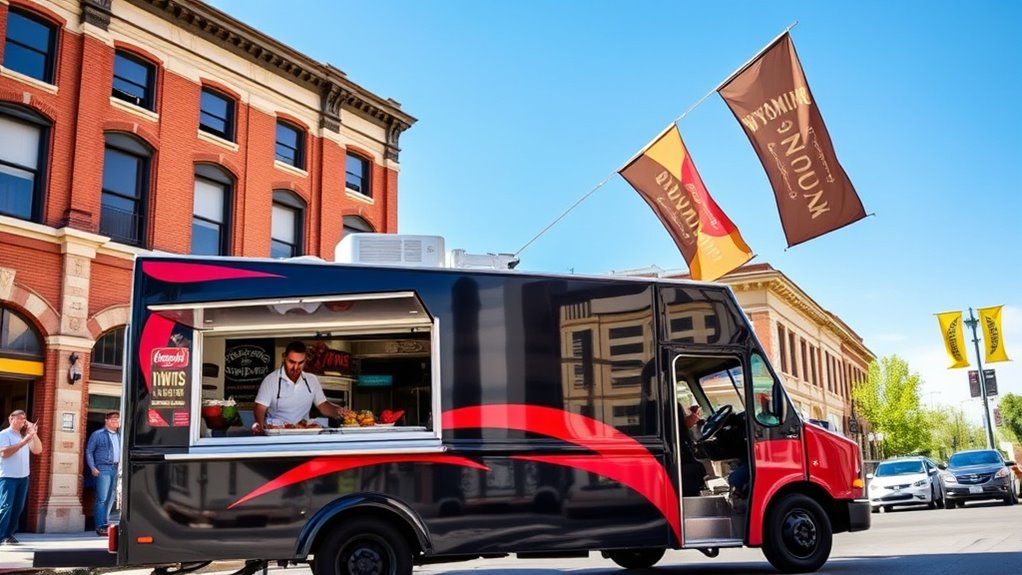To open a food truck in Cheyenne, you’ll need local permits, including a business license ($75) and a Mobile Food Unit permit from Laramie County health authorities. Expect startup costs from $40,000 to $150,000 for equipment and truck prep. Locations like downtown or Cheyenne Frontier Days grounds draw crowds, while a safe menu with compliant food safety measures is essential. Effective marketing and ongoing compliance guarantee long-term success—stay tuned to discover how to navigate each step smoothly.
Key Takeaways
- Obtain necessary permits including business license, mobile food unit permit, and fire safety clearance from Cheyenne and Laramie County authorities.
- Start-up costs range from $40,000 to $150,000, covering truck purchase, equipment, initial inventory, and licensing fees.
- Target high-traffic locations like downtown Cheyenne, Frontier Days grounds, and interstate rest areas for maximum customer reach.
- Develop a safe, compliant menu focusing on low-risk, ready-to-eat items with proper sourcing, labeling, and temperature controls.
- Use social media, mobile loyalty programs, and local advertising to market your food truck and attract repeat customers.
Navigating Permits and Licensing in Cheyenne
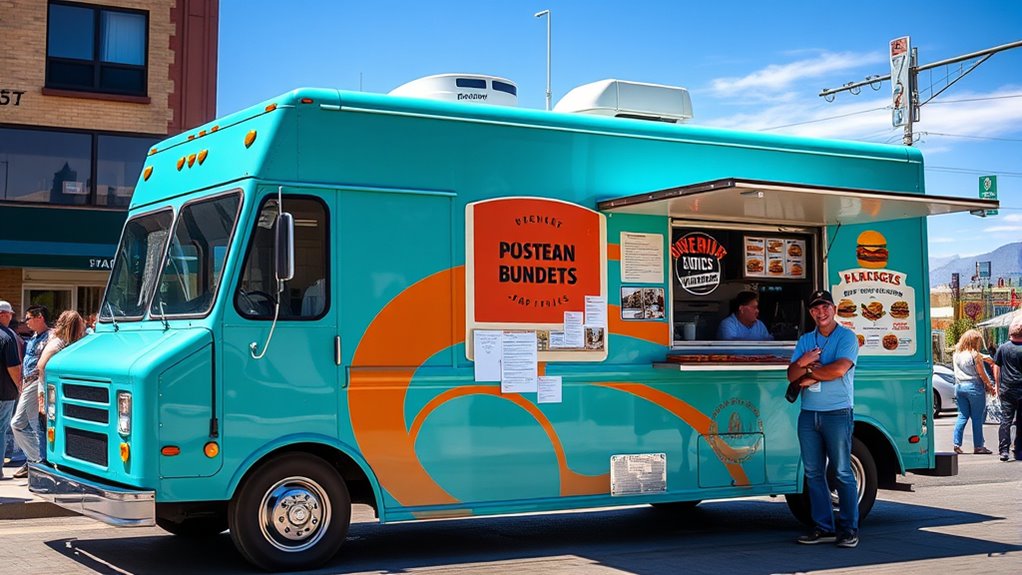
Handling permits and licensing in Cheyenne requires you to handle multiple steps to ensure your food truck complies with local regulations. First, you need a business license from the City Clerk, costing $75 per site or $50 for short-term operations every 14 days. You must also register your business entity, such as an LLC or sole proprietorship, with the Wyoming Secretary of State. Keep all licenses visible on your truck and maintain current records through the online portal. Additionally, you’ll need a Mobile Food Unit permit from Laramie County/Public Health, which involves meeting construction, equipment, and water supply standards. Fire safety is critical; complete a fire inspection and equip your truck with approved extinguishers and safety gear. Finally, confirm zoning, parking, and event-specific permits, ensuring you operate legally at all locations. Proper signage and color accuracy can help ensure your truck remains compliant and easily identifiable.
Estimating Startup Expenses for Your Food Truck
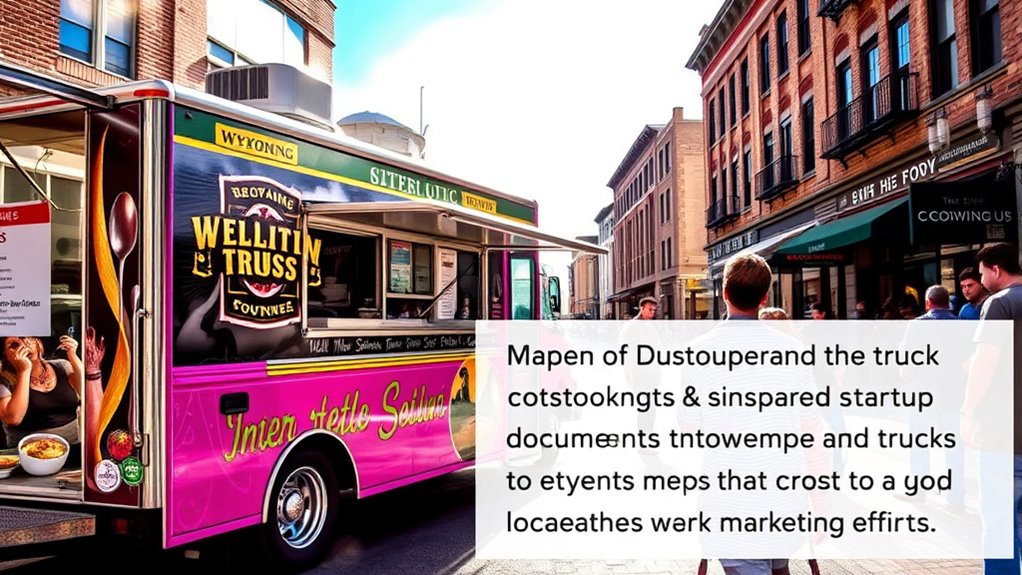
Estimating startup expenses for your food truck is a crucial step to guarantee you have sufficient capital and avoid surprises down the road. First, consider vehicle and equipment costs: a new or used food truck can range from $40,000 to $150,000, depending on size and customization. You’ll also need to budget for outfitting the truck with grills, fryers, and refrigeration. Second, initial inventory and supplies typically cost between $2,000 and $3,000 for ingredients, plus around $300 for serveware and disposables. Finally, don’t forget licensing and permitting fees, which in Cheyenne are relatively low—around $75 annually per vehicle, plus occasional permit costs. These expenses form the foundation of your startup budget and should be carefully planned to ensure your food truck’s successful launch. Considering anime movies can also be a fun way to unwind after a busy day of setting up your business.
Securing Prime Locations for Mobile Service
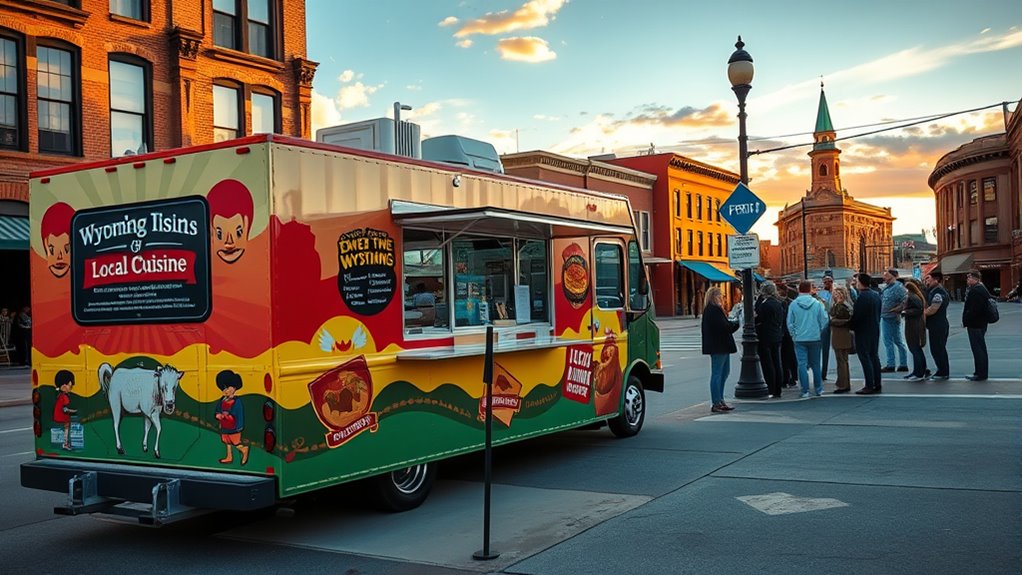
Securing prime locations for your food truck requires strategic planning and local knowledge of high-traffic areas. Downtown Cheyenne’s core around 17th Street and Capitol Avenue sees heavy foot traffic during lunch hours and weekend events, thanks to nearby offices, shops, and tourists. The Cheyenne Frontier Days grounds attract tens of thousands during the rodeo, offering concentrated vending opportunities. I-80 rest areas and the Terry Bison Ranch draw interstate travelers and weekend visitors, ideal for targeting transient audiences. The hospital campus and medical offices generate consistent daytime foot traffic, while industrial parks near Thomes Ave provide predictable lunch crowds—though these may require employer agreements. Keep in mind city permits, restrictions, and infrastructure needs, and use platforms like local directories to identify underserved spots and avoid oversaturation. Incorporating predictive modeling can help anticipate high-traffic times and locations for optimal placement.
Crafting a Safe and Compliant Menu
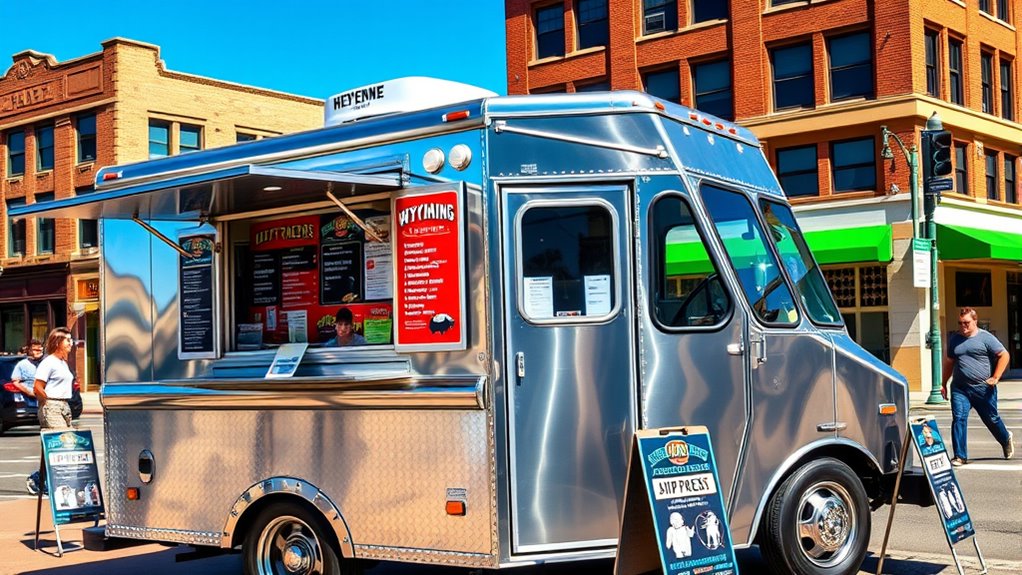
To craft a safe and compliant menu for your food truck, focus on selecting low-risk, ready-to-eat items that minimize temperature control and cross-contamination hazards. Prioritize simple options that are easy to prepare and serve safely. Here are three key steps:
Design a safe, compliant food truck menu by choosing simple, ready-to-eat items that minimize cross-contact and temperature risks.
- Limit TCS (time/temperature control for safety) items to reduce refrigeration and HACCP complexity.
- Avoid multi-component dishes requiring separate raw and cooked prep flows to prevent cross-contact.
- Use single-serve or protected formats like wrapped sandwiches or covered bowls to lower contamination risks.
- Incorporate vintage decor elements into your food truck’s design to create an inviting and nostalgic atmosphere that appeals to customers.
Additionally, source ingredients from approved suppliers with traceability records, and label prepackaged foods with date and identity. Implement strict temperature controls, separate storage, and staff training to ensure your menu remains both safe and compliant.
Ensuring Health and Safety Standards Are Met
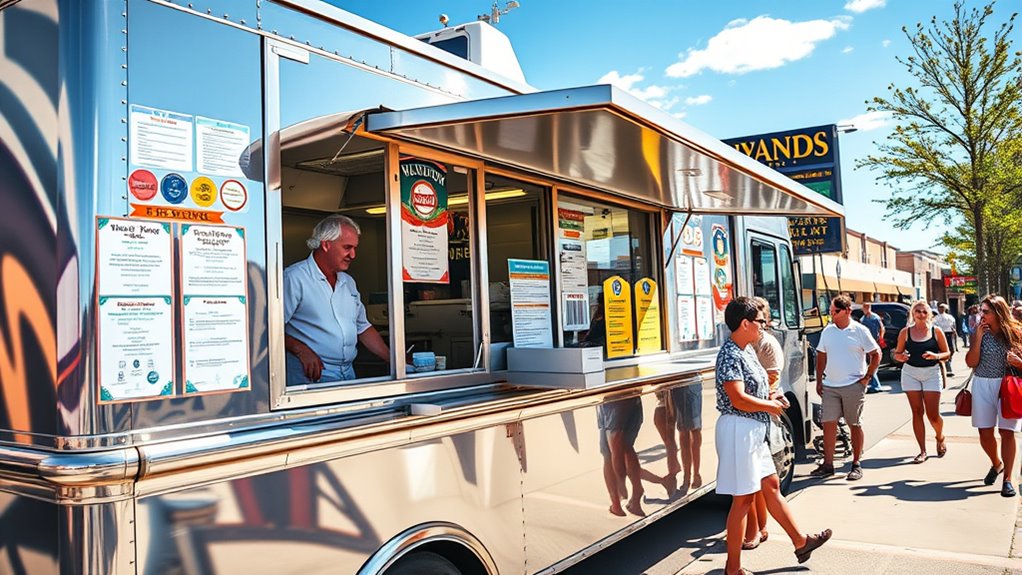
Meeting health and safety standards is a pivotal step in running a compliant and safe food truck operation. You must guarantee your truck’s interior surfaces are smooth and easily cleanable, with non-porous floors and walls. Proper refrigeration units, NSF-approved, are essential for storing perishables safely. Your setup requires five or six sinks, including a three-compartment sink, hand sink, and prep sink, all for thorough cleaning. Water must come from city or EPA-approved sources, with gray water disposed of properly at approved sites, avoiding contamination. Fire safety is vital; install fire suppression systems approved by local fire authorities and pass annual inspections. Finally, secure all necessary licenses and permits, including food and business licenses, and prepare for regular health inspections to uphold safety standards. Incorporating sustainability practices into your logistics can further enhance safety and environmental compliance.
Strategies to Promote Your Food Truck Business

Promoting your food truck effectively requires a mix of local partnerships, digital visibility, and engaging promotions. Building relationships with nearby breweries, bars, and coffee shops allows cross-promotion and shared audiences. Securing spots at busy sites like farmers markets or festivals boosts visibility and repeat visits. Arranging pop-up takeovers with local restaurants taps into existing customer bases and shares costs. Incorporating organized zones for different menu items or activities can also attract diverse customer groups and enhance the dining experience.
To maximize your reach, focus on these strategies:
- Collaborate with community events, festivals, and municipal gatherings for targeted exposure.
- Maintain active social media profiles with real-time updates, location tags, and menu specials.
- Build a mobile-friendly website with an email list, event calendar, and GPS tracking to attract new customers.
These tactics help increase awareness and drive traffic to your truck.
Maintaining Ongoing Compliance and Growth

To keep your food truck compliant and ready to grow, you need to stay on top of regular inspections and maintain accurate records. Training your staff to meet safety standards guarantees quality service and helps avoid violations. Additionally, expanding your marketing efforts can attract more customers and support long-term success. Furthermore, utilizing the new online licensing portal streamlines permit renewals and updates, ensuring your business remains in good standing with city regulations. Incorporating mindfulness techniques such as stress management can help staff remain focused and calm during busy hours, enhancing overall safety and efficiency.
Regular Inspection Scheduling
Maintaining ongoing compliance for your food truck in Cheyenne requires a well-structured inspection schedule aligned with local regulations and risk levels. To stay on top of inspections, focus on these key points:
- Schedule at least one final opening inspection and routine follow-ups, allowing five business days for scheduling.
- Prepare for higher-risk inspections if preparing TCS foods, which can mean up to four inspections per year based on your operation’s risk category.
- Keep detailed records, including temperature logs, sanitation schedules, and water testing results, to demonstrate ongoing compliance.
- Regularly updating your browser ensures that you can access the latest online resources and scheduling portals necessary for inspections.
- Understanding production quantity variance can help you better plan and allocate resources for your food truck operations, ensuring consistent quality and cost control.
Staff Training Standards
Ensuring ongoing compliance with staff training standards is essential for the safe and efficient operation of your food truck in Cheyenne. You must provide regular refresher courses for all employees on food safety, hygiene, emergency procedures, and allergen management. Designate a Certified Food Manager (CFM) to oversee compliance and ensure they pass an ANSI-accredited exam. Train staff in hazard identification, cross-training roles, and emergency response, including fire safety specific to food trucks. Keep detailed records of training completion and certifications, tracking expiration dates and scheduling renewals proactively. Use online platforms to update staff on regulatory changes and best practices. The certification is typically valid for 5 years, and regular assessments and mock drills will help maintain high standards, reduce risks, and guarantee your team remains prepared to serve safely and efficiently. Additionally, staying informed about food safety regulations and implementing best practices can further enhance your compliance efforts.
Marketing Expansion Strategies
Expanding your food truck’s marketing efforts requires a strategic approach that balances growth with ongoing compliance. To stay ahead, focus on these key strategies:
- Use geotargeted social ads to promote your truck’s location and specials in real time, reaching nearby customers within specific radii. Incorporating privacy policies ensures that your advertising adheres to legal standards and maintains customer trust.
- Deploy a mobile loyalty program—points, punch cards, or app-based rewards—to encourage repeat visits and track customer data for future campaigns.
- Launch interactive social campaigns like polls, contests, and UGC challenges to boost shareability and organic reach, measuring engagement through UTM links.
- Regularly monitor and respond to customer reviews on platforms like Google and Yelp to maintain a positive online reputation and foster community trust. Online reputation management
Additionally, keep your website and Google Profile updated with hours, menu, and location info. Integrate online ordering and analytics to optimize promotions based on sales data, ensuring continued growth.
Frequently Asked Questions
How Long Does the Permit Approval Process Typically Take in Cheyenne?
The current question asks how long the permit approval process takes in Cheyenne. Typically, it’s around 5-10 business days for mobile food vendor applications, but this can vary. Cheyenne is moving to an online system to speed things up, though exact times aren’t published yet. In some cases, like event permits, it can take 2-4 weeks. Make sure your application is complete to avoid delays.
Are There Any Restrictions on Operating Hours for Food Trucks in Cheyenne?
Back in the day, food trucks roamed freely, but today, Cheyenne restricts your hours. You can operate from 8 am to 5 pm Tuesday through Saturday, with summer Sunday hours from noon to 5 pm. Outside these times, you’ll need special event permits. Staying within these limits is essential; violating them could mean fines or permit issues. Always check with city officials to stay compliant and avoid disruptions.
Can I Operate My Food Truck on Private Property Without City Permits?
You can’t operate your food truck on private property without city permits in Cheyenne. The city’s Unified Development Code and health regulations require permits for food truck operations, even on private land. Operating without these permits risks fines, closure, and enforcement actions. To stay compliant, you need the appropriate zoning approval, health and fire safety inspections, and a valid city license, regardless of whether you’re on public or private property.
What Are the Specific Insurance Requirements for Food Truck Operators?
Think of insurance as the shield that keeps your food truck adventures safe. You’ll need commercial general liability to protect against customer injuries, auto liability for road operations, and food contamination coverage if serving ready-to-eat foods. Don’t forget workers’ comp if you hire staff, and equipment coverage for your tools. Confirm your policies meet minimum limits and include additional insureds like city or event organizers—your safety net on wheels.
Are There Any Subsidies or Grants Available for New Food Truck Businesses?
You’ll find several grants and subsidies that support new food truck businesses in Wyoming. The Wyoming Startup Business Builder grant offers up to $15,000 for expanding food production, focusing on local food systems. Additionally, regional USDA programs and the Wyoming Regional Food Business Center provide funding opportunities, especially if your truck connects to broader food infrastructure or regional supply chains. Check with local Cheyenne economic offices for microgrants and promotional support opportunities.
Conclusion
Starting your food truck in Cheyenne is like steering a well-oiled machine—you need to handle permits, costs, locations, menu, and marketing smoothly. By staying organized and proactive, you’ll turn your dream into a thriving mobile eatery. Keep up with regulations, choose the right spots, and promote your unique offerings. With dedication and smart planning, your food truck will become as irresistible as a siren’s call, drawing hungry customers and growing your business every day.
